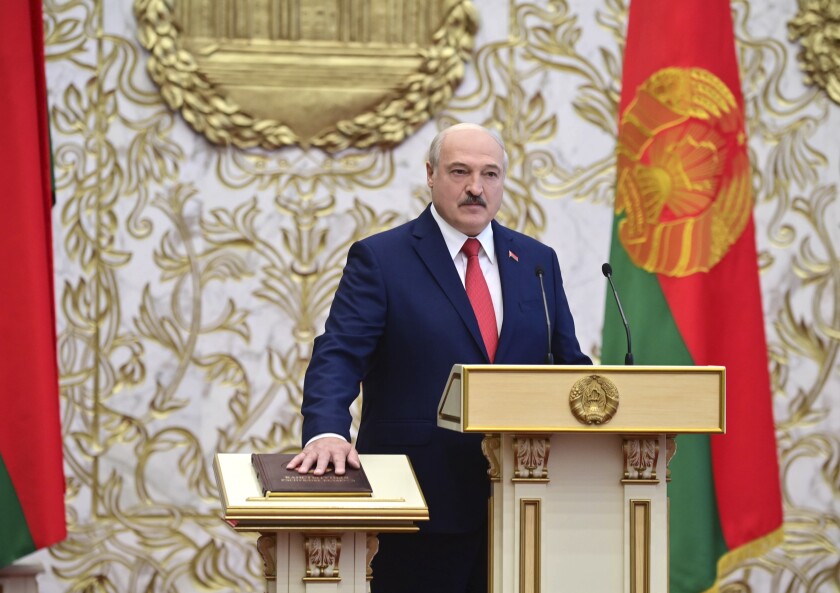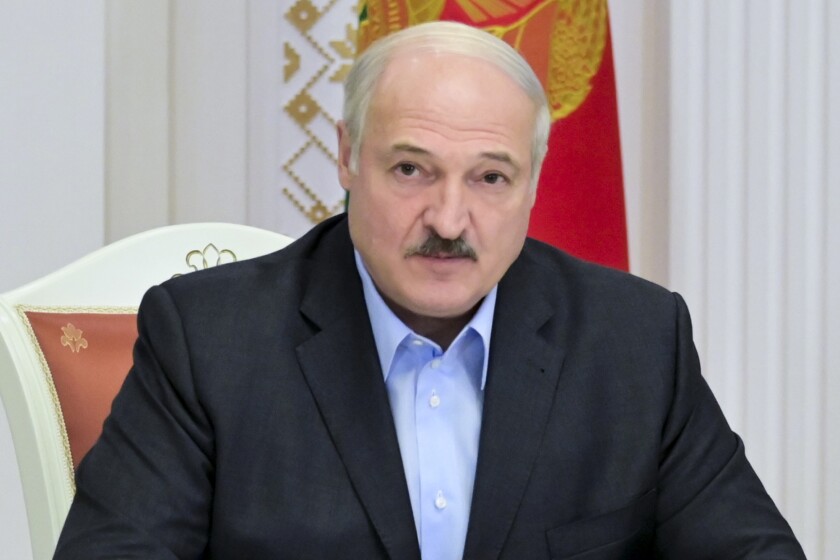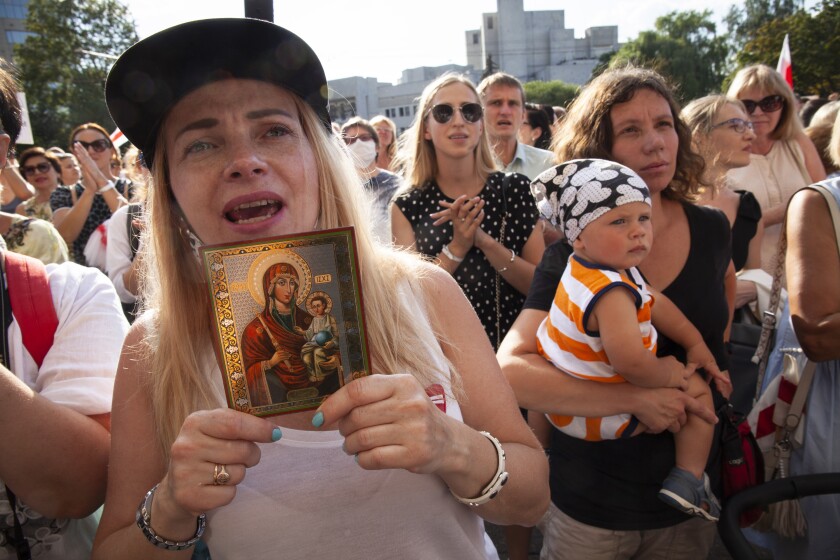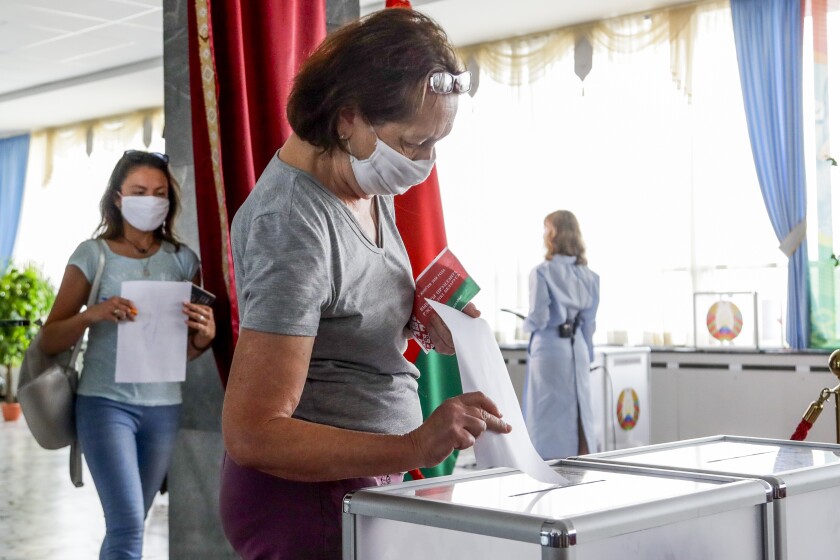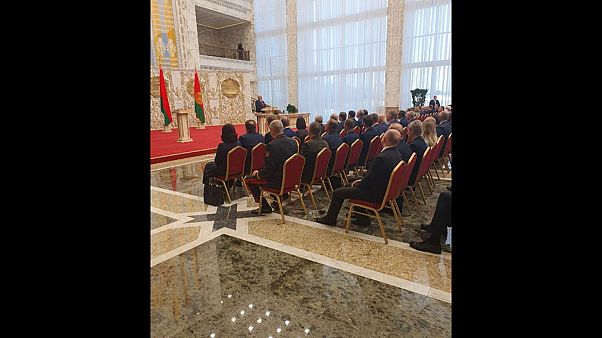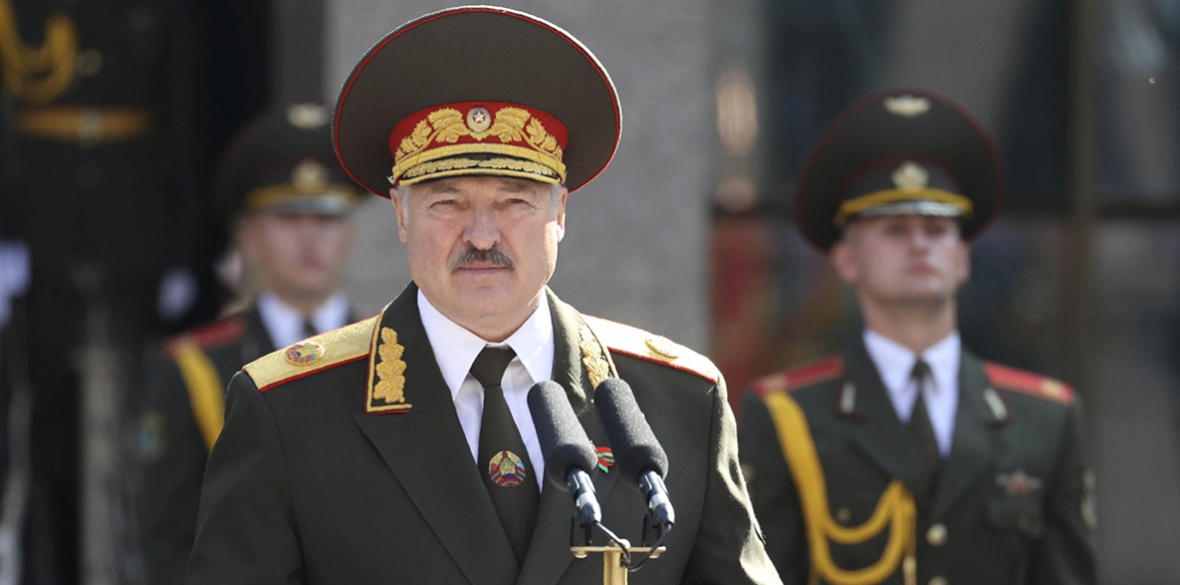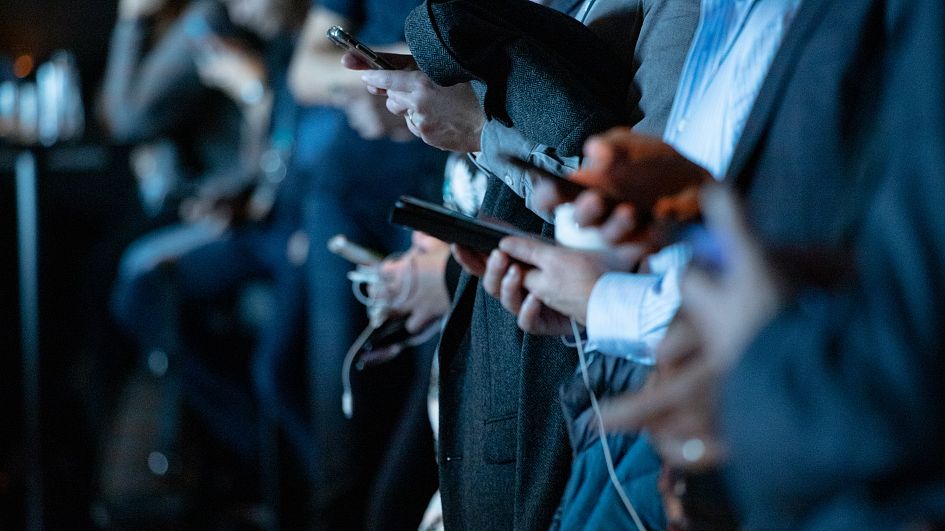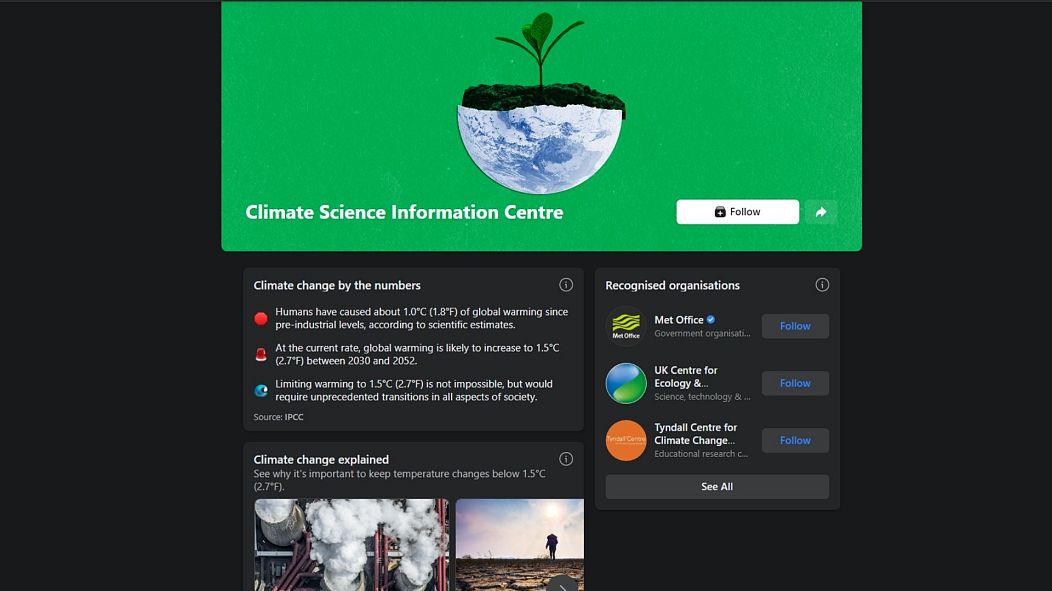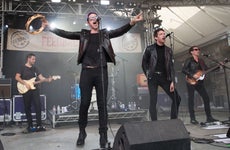Opinions expressed in View articles are solely those of the authors.
When a man has ruled for decades, his loss of power is always unexpected - until it happens. In Montenegro on August 30, President Milo Djukanovic – in power with his party for nearly 30 years – lost the parliamentary election. It is the first time in history that his Democratic Socialists have been defeated.
After such a lengthy rule, a transitionary process must take place. All manner of possibility now lays before the incoming new coalition government; though they must also be conscious of the risks ahead.
Part of the reason Djukanovic’s party have been able to cling to power for so long was his ability to play the West against its fear of Russian influence. Pitching himself as a Western reformer, he branded the opposition – falsely - in election after election as eastern-facing in order to enlist western nations’ support, whilst turning a blind eye to widespread and well-reported corruption and electoral fraud.
Despite the change in parliamentary arithmetic Djukanovic will, however, still hold the presidency. Now the new government will have a critical role to play in holding him to account. It must ensure the president does not use his position to manufacture immunity from questions over corruption which he now must answer.
The new, incoming coalition government has decisively moved to dispel this myth.
emphatically pledges to “strengthen and enhance cooperation with NATO.” Combined with previous pronouncements on accelerating EU membership talks, they have lanced Djukanovic’s claims.
During Montenegro’s accession talks in 2017, America identified members of Montenegrin intelligence as Russian operatives. They demanded their removal. Djukanovic obliged, yet not as expected: he simply transferred them from
.
Getting serious about removing these influences in state institutions can be the first signal of intent to western allies. It will bring the benefits of their cooperation in reforming those institutions. But to fully dislodge the president’s hand from Montenegro’s levers of power, the coalition will need the largest possible working majority they can muster.
If the election was one thing, it was an emphatic rejection of a discredited and corrupt regime. Those already in the coalition are, wisely, already opening the door to smaller minority parties. Currently, three alliances formally constitute the grouping. This gives them 41 seats in a house of 81. More can and should be added to drive meaningful change efficiently through parliament.
Montenegro’s future is in the EU, says prime minister-in-waiting Zdravko KrivokapicIn addition, the coalition must roll back the religious law that was ultimately Djukanovic’s downfall. Forced through parliament last December, the controversial statute set off the nation’s largest-ever public protests. Yet, after diminishing other sectors of civil society – particularly the media and NGOs – the Orthodox Church was one remaining pillar the opposition could still unite around.
So, the people did. The law provided for the reinvention of church property as state property. Yet, a united front emerged, joining the church’s followers, those who cared about freedom of religion, property rights and Montenegro’s constitution in protest against the law and the president.
The repeal of the statute will return the freedom for all to follow their own religion in peace. Then the healing between religious cleavages and ethnicities – divided through electoral strategy by Djukanovic for decades – can begin.
Thirdly, state capture and corruption must be tackled. A Commission of Inquiry should be initiated to uncover the extent of theft under Djukanovic’s administration. The country needs to close a chapter of plunder, much like the people of Malaysia are so doing through
discovering the depths of the 1MDB scandal. Investigating decades of state theft, the new administration will address the root cause for a dearth of foreign direct investment: namely, the severe lack of trust by international financiers in the rule of law.
And that need for new investment is urgent: for swift action is required on jobs, the economy, and public debt.
Immediately, the new government must ensure they put in place proper protections and support measures for citizens and small businesses suffering from coronavirus measures and poor government – something Djukanovic has conspicuously failed to do, despite holding all the levers of power up until the election.
The tourism industry – which supports tens of thousands of jobs – has been hit not only by coronavirus measures but by the outgoing government’s nationalist and arbitrary goal of barring Serbian citizens from entering the country. This must be reversed, and our regional friends welcomed once more, both for the sake of good neighbourliness and the economy.
And in the medium and longer-term, the overbearing national debt must be reduced. Projects such as the
Chinese-debt funded “road to nowhere” should be reviewed and – if necessary – ended, and projects more favourable to the public and the public purse should be brought into play instead.
Despite the change in parliamentary arithmetic, Djukanovic will, however, still hold the presidency. Now the new government will have a critical role to play in holding him to account. It must ensure the president does not use his position to manufacture immunity from questions over corruption which he now must answer.
An era has drawn to a close in Montenegrin political history. A monopoly of power has been punctured for good. But the balance of power between parliament, presidency and state institutions still leaves much room for manoeuvre. Djukanovic endured as long as he did because he was a canny operator. The new coalition must recognise that the real challenge is just beginning.
_
Duško Knežević is President of Mediterranean University based in Podgorica, Montenegro, and is Chairman of the Atlas Group Corporation_
Montenegro election: Who are the triumphant opposition factions and what do they stand for? By Vladimir Utjesinovic • last updated: 02/09/2020
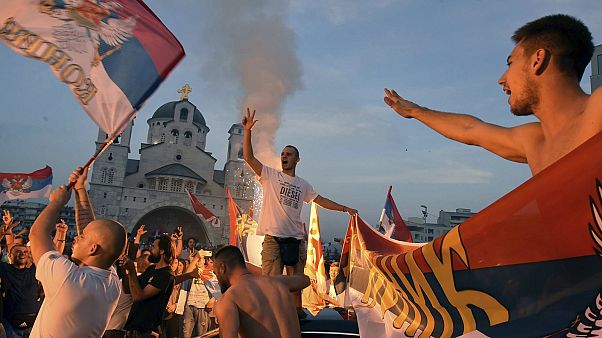
Opposition supporters celebrate the election results outside the Serbian Orthodox Church of Christ's Resurrection in Podgorica, Montenegro. - Copyright
Risto Bozovic/Associated PressThe election in Montenegro on Sunday resulted in a slender victory for the opposition, ending the near 30-year-rule of Milo Đukanović’s Democratic Party of Socialists (DPS).
Consisting of three blocs or alliances, For the Future of Montenegro, Peace is Our Nation and Black on White, the opposition won a wafer-thin majority with 50.7 per cent of the votes, or 41 out of 81 seats in the Montenegrin parliament.
What happens now that the die has been cast?
According to the country's constitution, the newly-elected parliament must sit within 15 days of the final election results being declared with the prime minister-designate, proposed by the president, in place within 30 days of the first sitting of parliament.
Whilst the election resulted in a win for the opposition, it is still unclear what the composition of the new government will look like.
Despite the unifying goal of unseating the current DPS government and assurances that they are collectively committed to staying the course on issues such as EU integration, the rule of law and the overturning the DPS government's law on religious freedom, the opposition’s disparate values and agendas may mean that forming a viable alternative government is not an easy task.
Clash of ideologies
One of the biggest challenges will be the reconciling of opposing pro-EU and pro-Serbia and Russia stances across the competing opposition alliances. The general opinion among voters tends to reflect an anxiety that ideological antagonisms will most likely be the source of any future instability within the new government.
There have also been suggestions of a national unity government, which would not include the Future of Montenegro alliance - the largest bloc in the opposition. Ultimately, the most probable outcome remains a coalition of the three main strands of the opposition.
Montenegro's ruling party could be ousted from power for first time in 30 yearsMontenegro elections: Thousands take to streets as opposition claims victoryIn Montenegro, a divided nation chooses between east and westSo, who are these entities and what do they stand for?
For the Future of Montenegro
Share of the vote: 32.5 per cent and 27 seats
Political position: right-wing
This 11-party alliance is dominated by mostly pro-Russian and anti-NATO parties, advocating for stronger ties with Serbia. They have coalesced around the populist “Democratic Front”, whose leaders Andrija Mandić and Milan Knežević were convicted of an attempted coup d’état in 2016, allegedly organised by members of the Russian military intelligence agency GRU.
The alliance enjoys the patronage of the Serbian Orthodox Church, which called on its followers to vote for it in the election on Sunday. In the run-up to the national poll, the Church organised and encouraged opposition rallies after the government passed a controversial law which church leaders said enabled the state to acquire its assets.
The leader of the alliance, Zdravko Krivokapić, even celebrated the announcement of the election results in the Podgorica Cathedral of the Serbian Orthodox Church, hugging the 82-year-old Metropolitan bishop of Montenegro, Amfilohije Radović.
The alliance’s grey eminence is businessman Miodrag “Daka” Davidović, a former minister in the government of the self-proclaimed Serbian Autonomous Region (SAO) of Herzegovina from 1991 to 1992, a territorial entity in Bosnia and Herzegovina founded by convicted war criminal Radovan Karadžić.
Marko Milačić, the founder and president of the populist right-wing True Montenegro party, is also on the alliance’s electoral list, having in previous years led the anti-NATO campaign by publicly burning NATO flags.
Peace is Our Nation
Share of the vote: 12.5 per cent and 10 seats
Political position: centre-right
Consisting of four political groups, the coalition's political programme is based on post-war reconciliation but they are predominantly oriented towards pro-Serbian voters. During the campaign, they did not talk much about identity issues and the foreign policy course of Montenegro.
The civic political movement is led by Aleksa Bečić’s centrist Democratic Montenegro party, which was created after a split in the Socialist People's Party, the Montenegrin branch of former Serbian president Slobodan Milošević's SPS.
Although they won eight parliamentary seats in the 2016 elections, they boycotted Montenegro’s National Assembly for four years.
Another important party of the coalition, Miodrag Lekić's DEMOS, was formed by his withdrawal from the opposition Democratic Front. Lekić was the opposition candidate in the presidential election in 2013 in which he was defeated by Filip Vujanović. Lekić was foreign minister in the Đukanović government in the early 1990s, and later, during Milosevic's rule, ambassador to FR Yugoslavia.
Black on White
Share of the vote: 5.5 per cent and 4 seats
Political position: centre-left
The liberal coalition consists of three parties and a group of independent intellectuals.
Despite its small share of the vote, this civilian-led movement will be kingmaker, deciding who will form the government in Montenegro for the next four years.
Ideologically, it differs significantly from the other two opposition blocs. Much closer to the DPS than to pro-Serbian parties, they have always stated that their only goal is to fight against the outgoing DPS government. After the elections, the movement decisively ruled out forming a post-election coalition with Đukanović's DPS.
In the election campaign, they offered an original manifesto promise - a government without politicians, composed only of experts, regardless of political, national and religious affiliation.
The leader is ethnic Albanian Dritan Abazović, one of the founders of the Civic Movement United Reform Action (URA), a socially-liberal and green political party. A former member of parliament for Pozitivna, or the Positive Montenegro party, which dropped below the electoral threshold and lost its parliamentary status after supporting Đukanović in a confidence vote in 2016, Abazović left to co-found URA five years ago. The URA was supported in this year's election by numerous intellectuals of various ideological profiles who opposed the incumbent DPS government.
The co-founder and ideologue of the group is businessman Žarko Rakčević, a former deputy prime minister of Montenegro in the second DPS-SDP coalition government from 2001 to 2003.
While the URA was at the centre of controversy during the campaign after Tatjana Bečanović, a member of the party's presidency, denied the existence of genocide in Srebrenica, the movement is openly committed to continuing on Montenegro’s path to accession as an EU member and a pro-Western foreign policy.
Montenegro's ruling party could be ousted from power for first time in 30 years By
Orlando Crowcroft & Alessio Dell'Anna with Associated Press • last updated: 31/08/2020
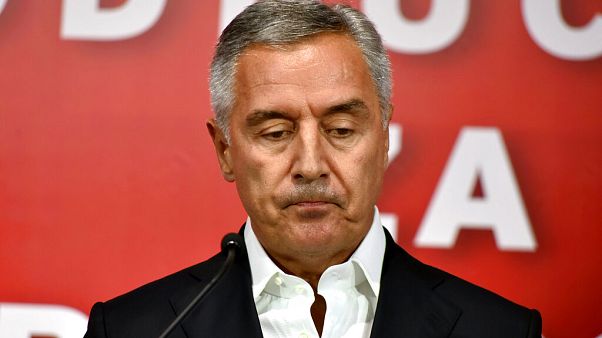
Montenegrin President Milo Djukanovic speaks at his DPS party headquarters in Podgorica, Montenegro, early Monday, August 31 - Copyright
AP PhotosMontenegro's pro-Western Democratic Party of Socialists (DPS) has secured 35% of votes in a tight and bitterly-contested parliamentary election, its worst result since the country won independence from Serbia 14 years ago.
Official results show the pro-Serbian opposition alliance on 32.5%, meaning that it could feasibly form a government if it can reach consensus with Montenegro's other two opposition parties. That would see the DPS lose control of power in the Balkan nation for the first time in 30 years
President Milo Djukanovic, who has personally led Montenegro for three decades since Yugoslavia was dismantled in the early 1990s, said Monday that the DPS would respect the election results but claimed that it was "the strongest party in Montenegro."
Meanwhile, the leader of the pro-Serbian coalition, Zdravko Krivokapic, told supporters: "The regime has fallen."
Djukanovic's ruling DPS has governed Montenegro since 1991, leading the country to independence from Serbia in 2006 and towards membership of the European Union. Djukanovic took Montenegro into the transatlantic NATO alliance in 2017, in the face of vocal opposition from pro-Serb forces.
But it was a local issue that dominated the election this year. A row over the property rights of the Serbian Orthodox Church has pitted the pro-Western government against an alliance of pro-Serb and pro-Russian forces, led by the Democratic Front party.
In 2016, police uncovered a plot to stage a coup on election day, installing a pro-Russia and pro-Serb government in its place.
Unholy row exposes deep divisions in MontenegroIn Montenegro, a divided nation chooses between east and westMontenegro is heading the same way as Belarus. Not enough is being done to avoid disaster ǀ ViewPrior to the vote, analysts told Euronews that the election in Montenegro was a "litmus test" for the wider Balkans, while data showed that the nation of 620,000 was more divided than ever on key issues such as membership of the European Union.
Sinisa Vukovic, a senior lecturer at the School of Advanced International Studies (SAIS) at Johns Hopkins University, said that the row over ownership of church property - and the election more generally -
was about two competing visions for what Montenegro is, and where it is going."These are cleavages that have existed for decades, if not centuries, and now they are entrenched. Now it is a matter of: 'You are either with us or against us' - compromise may actually not be on the cards,” he said.
But while the opposition could now feasibly put together a governing coalition, it would bring together parties of divergent political views with little in common than opposition to the DPS generally, and to Djukanovic personally. It would only secure 41 out of the parliaments 81 seats.
Voting day
Indicating high interest in the election, more than half of eligible voters had cast their ballots by midday. Lines formed outside some polling stations on a very hot summer day.
Opinion polls ahead of the election predicted the DPS ahead of other groups, though not with enough margin to form a government on its own.
Many other smaller parties - including those run by ethnic minorities - are also in the race, which is being held
amid a new outbreak of coronavirus.
Prime Minister Dusko Markovic said the state would deal with any attempts to affect this election.
“This is the day when Montenegro decides to move strongly forward toward economic and general development — a Montenegro that is a member of the European Union and a reliable member of NATO," he added.
YOU MIGHT ALSO LIKE
In Montenegro, a divided nation chooses between east and westUnholy row exposes deep divisions in MontenegroMontenegro’s future is in the EU, says prime minister-in-waiting Zdravko Krivokapic /cloudfront-us-east-1.images.arcpublishing.com/tgam/7V64J245WVNCDHV4Q55F2IC6JE.jpg)
